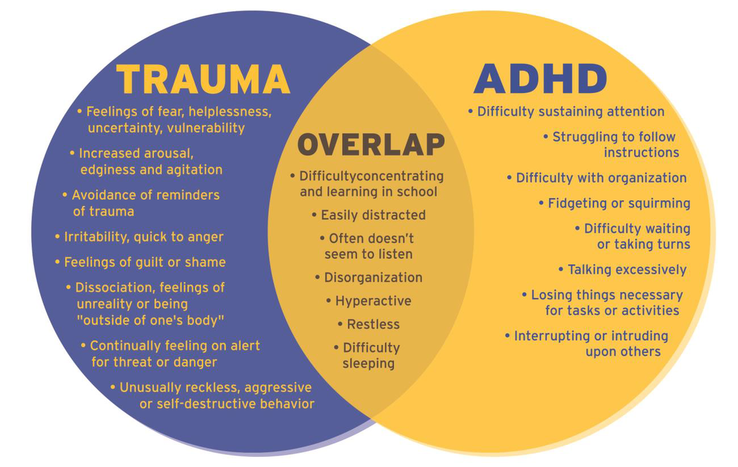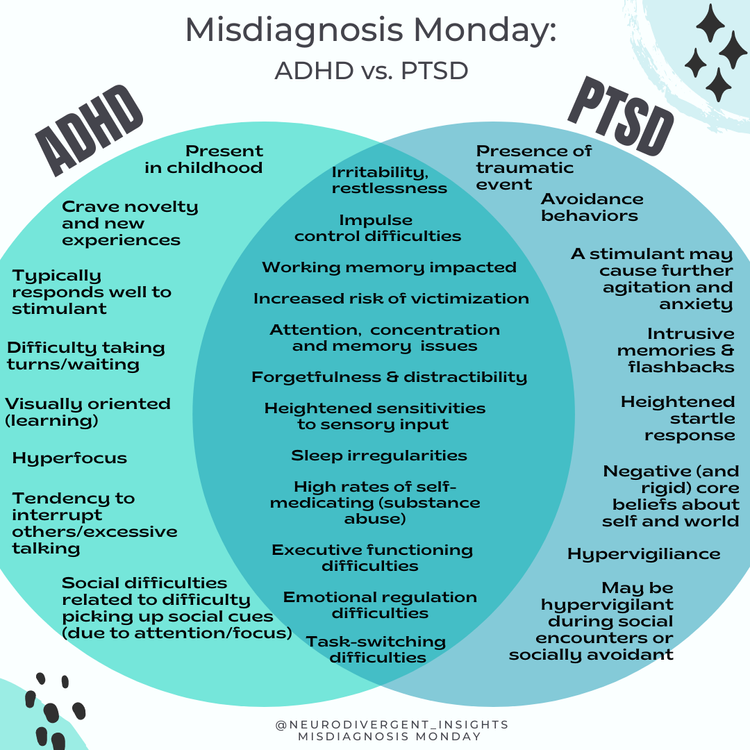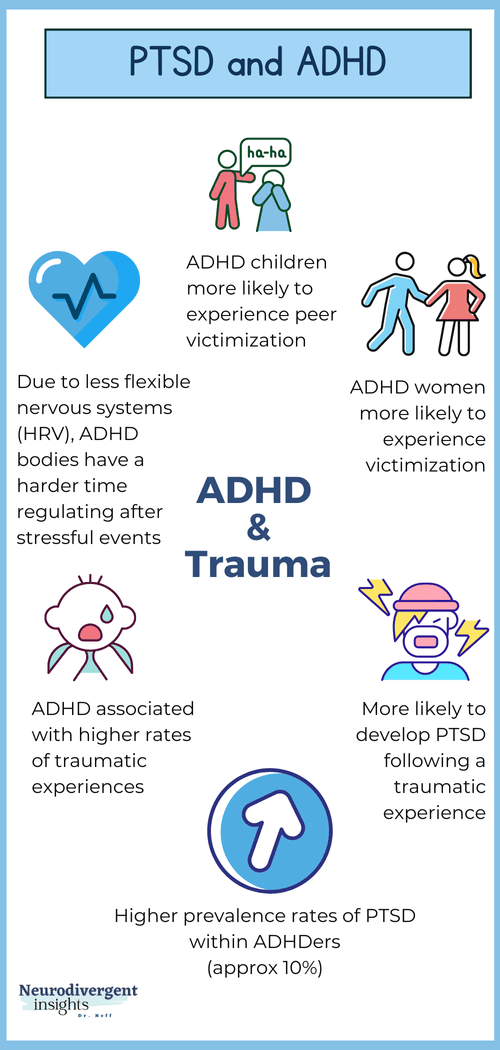
Attention deficit hyperactivity disorder (ADHD) is a neurodevelopmental disorder characterized by inattention, hyperactivity, and impulsivity. It is one of the most common mental disorders in children, affecting about 6.1 million children aged 4-17 in the United States. ADHD can also continue into adulthood, affecting about 6.5% of adults.
Symptoms of ADHD can vary from person to person and can change over time. However, some common symptoms include:
- Difficulty paying attention
- Being easily distracted
- Daydreaming often
- Forgetfulness
- Fidgeting or restlessness
- Talking excessively
- Interrupting others
- Acting without thinking
- Taking risks
ADHD can have a significant impact on a person's life, making it difficult to succeed in school, at work, and in relationships. People with ADHD may also be more likely to experience other mental health conditions, such as anxiety and depression.
Post-traumatic stress disorder (PTSD) is a mental health condition that can develop after experiencing or witnessing a traumatic event. Traumatic events can include things like violence, accidents, natural disasters, or war.
PTSD symptoms can vary from person to person and can start within days or even years of the traumatic event. Some common symptoms include:
- Flashbacks or nightmares of the traumatic event
- Avoiding things that remind you of the traumatic event
- Feeling anxious or on edge
- Having trouble sleeping
- Feeling angry or irritable
- Feeling numb or detached
- Difficulty concentrating
PTSD can have a significant impact on a person's life, making it difficult to work, go to school, and maintain relationships. People with PTSD may also be more likely to experience other mental health conditions, such as anxiety and depression.
Link between ADHD and PTSD
People with ADHD are more likely to develop PTSD than people without ADHD. This is likely due to a number of factors, including:
- Shared risk factors: ADHD and PTSD share some risk factors, such as genetics, childhood trauma, and exposure to violence.
- Brain differences: People with ADHD have differences in the way their brains function, particularly in areas related to attention, impulse control, and emotional regulation. These differences may make people with ADHD more vulnerable to developing PTSD after a traumatic event.
- Symptom overlap: Some symptoms of ADHD and PTSD overlap, such as difficulty concentrating, hypervigilance, and irritability. This can make it difficult to diagnose PTSD in people with ADHD.
Treatment for ADHD and PTSD
There are a number of effective treatments available for ADHD and PTSD. These treatments can help to reduce symptoms and improve quality of life.
Common treatments for ADHD include:
- Medication: Stimulant medications are often used to treat ADHD. These medications can help to improve attention and focus.
- Therapy: Cognitive-behavioral therapy (CBT) is a type of therapy that can help people with ADHD to learn skills to manage their symptoms.
- Education and support: Learning about ADHD and getting support from others can help people with ADHD to manage their condition and live successful lives.
Common treatments for PTSD include:
- Therapy: CBT and exposure therapy are two types of therapy that are often used to treat PTSD. These therapies can help people to process their trauma and learn coping skills.
- Medication: Antidepressants and anti-anxiety medications can be used to treat symptoms of PTSD, such as depression and anxiety.
If you think you or someone you know may have ADHD or PTSD, it is important to seek professional help. A mental health professional can assess your symptoms and recommend the best course of treatment.
WebResearch suggests a relationship between ADHD and post-traumatic stress disorder (PTSD). Kids with ADHD may be at risk for increased trauma due to their. WebComplex post-traumatic stress disorder (CPTSD) is now recognized as a sibling diagnosis for PTSD in guidelines updated by the World Health Organization. A. WebAttention-deficit hyperactivity disorders (ADHD) and posttraumatic stress disorder (PTSD) are the most commonly diagnosed disorders in sexually abused children (SAC). There is. WebADHD is a mental disorder that is characterized by problems with focus, hyperactivity, and impulsiveness. PTSD is a mental disorder that can develop after a person has. WebComparing ADHD & PTSD symptoms. While ADHD and PTSD are different diagnoses, they share many symptoms. Symptoms that are common to both PTSD and.
PTSD & ADHD: Comparing Symptoms, Behaviors & Co-Effects (with Nicole Brown, M.D.)

Source: Youtube.com
WHY IS MY BRAIN SCATTERED After My TRAUMA || ADHD & PTSD || Psychotherapy Crash Course

Source: Youtube.com
What Is Adhd And Ptsd, PTSD & ADHD: Comparing Symptoms, Behaviors & Co-Effects (with Nicole Brown, M.D.), 2.01 MB, 01:28, 5,038, ADDitude Magazine, 2022-06-03T21:35:20.000000Z, 2, ADHD and Complex Trauma - Child Development Clinic, 467 x 738, jpg, , 3, what-is-adhd-and-ptsd
What Is Adhd And Ptsd. WebPTSD and ADHD can trigger abnormal levels of hormones that set off your "fight-or-flight" response. Some studies suggest there's a genetic link between the two conditions. Diagnosing ADHD ... WebThere are several overlapping symptoms between PTSD and ADHD, including concerns with executive functioning and restlessness. There also are some defining differences,.
"Traumatic stress can worsen ADHD symptoms. What we know from the literature out there is that between 10 and 17 percent of trauma-exposed children meet ADHD criteria. Have the co-occurance of each actually worsens the effect of the other." - Nicole M. Brown, M.D.
This video comes from the ADDitude webinar with Dr. Brown titled "How Stress and Trauma Affect ADHD in Children of All Colors," available for replay here: youtu.be/kcbXXGO5MQo
#PTSDAwareness
What Is Adhd And Ptsd, WebADHD is a mental disorder that is characterized by problems with focus, hyperactivity, and impulsiveness. PTSD is a mental disorder that can develop after a person has. WebComparing ADHD & PTSD symptoms. While ADHD and PTSD are different diagnoses, they share many symptoms. Symptoms that are common to both PTSD and.

ADHD and Complex Trauma - Child Development Clinic - Source: childdevelopmentclinic.com.au

PTSD or ADHD? - Source: neurodivergentinsights.com

PTSD or ADHD? - Source: neurodivergentinsights.com
Can ptsd make adhd worse adhd-and-ptsdUnderstanding ADHD and Trauma: Navigating the Complex ...
Can ptsd make adhd worse Trauma is a result of events that deeply shake one's sense of safety, potentially leading to posttraumatic stress disorder (PTSD) or C-PTSD, with symptoms ranging across emotional, psychological, and physical spectrums. Trauma and ADHD have a complex, intertwined relationship, impacting brain structure and function in overlapping ways. Can ptsd cause adhd.
Can ptsd cause adhd adult-adhd-ptsdAdult ADHD and PTSD: What's the Link? - WebMD
Can ptsd cause adhd PTSD and ADHD can trigger abnormal levels of hormones that set off your "fight-or-flight" response. Some studies suggest there's a genetic link between the two conditions. Link between adhd and ptsd.
Link between adhd and ptsd
Link between adhd and ptsd What is the difference between adhd and ptsd.
What is the difference between adhd and ptsd
What is the difference between adhd and ptsd What is adhd and ptsd.
What is adhd and ptsd
What is adhd and ptsd What is the difference between adhd and ptsd.
sis-is-it-adhd-or-ptsdHow to Differentiate ADHD and PTSD Overlap - medcentral.com
As of 2022, an estimated 8.7 million adults live with ADHD in the United States. 1 And in every 100 adults, about 5% have PTSD; in 2020, about 13 million Americans had PTSD. 2. While the exact links between ADHD and PTSD are unknown, individuals with ADHD often have low self-esteem and make impulsive decisions, noted Chris Aiken, MD, director , .
dhd-and-traumaADHD and Trauma: Similarities and Differences | Psych Central
ADHD vs. trauma. ADHD is a mental health condition typically characterized by inattentive, hyperactive, or impulsive behavior. On the other hand, trauma is a mental, emotional, or physical , .
atic-stress-adhdTraumatic Stress and ADHD: Symptoms, Coping Strategies - ADDitude
ADHD and symptoms related to trauma, such as PTSD, can co-occur and exacerbate each other, so the presence of both leads to more problems than occur with ADHD or PTSD alone. In all, to develop an effective treatment plan, it is vital that a person with ADHD find a clinician who inquires about trauma during the course of an ADHD evaluation. As , .
.
.
.
.
symptoms-adhd-diagnosisPTSD Symptoms? Or ADHD? A Comparison of Comorbidities - ADDitude
PTSD and ADHD Symptoms: The Differences and Similarities ADHD is a neurological and developmental disorder. Children with ADHD have less developed, smaller, and less active areas of the brain that deal with emotions, self-awareness, and impulsivity. .
rstanding-adhd-andADHD and Trauma: The Relationship, Symptoms & Treatments
Can ptsd cause adhd symptoms.
Can ptsd cause adhd symptoms
Can ptsd cause adhd symptoms Can ptsd make adhd worse.
0 Comments